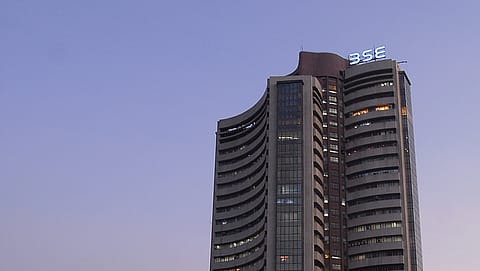Sensex crashes 1,450 pts amid global sell-off; investor wealth erodes by ₹5.5 lakh cr
On Monday, the market capitalisation of BSE-listed companies was wiped by around ₹5.5 lakh crore to ₹246 lakh crore.

The domestic benchmark indices BSE Sensex and NSE Nifty50 suffered sharp losses on Monday, mirroring weakness in global peers amid boiling U.S. inflation as well as sustained selling by foreign investors. The anticipation of aggressive rate hike by the U.S. Federal Reserve to curb inflation and fresh Covid-19 waves in China raised concerns about global economic growth. Investors also remained on edge ahead of the government’s data on consumer inflation (CPI) in India due later in the day. India VIX, a volatility index based on the NIFTY Index Option prices, settled 14.25% higher at 22.36, after surging more than 16% during the session.
Extending Friday’s fall over 1,000 points, the 30-share Sensex tumbled 1,457 points, or 2.68%, to hit a one-month low of 52,847 levels on Monday, with 29 of 30 index heavyweights closing in negative terrain. The benchmark index has fallen 2,474 points in last two sessions, wiping out nearly ₹11 lakh crore of investors’ wealth during this period. On Monday, the market cap of BSE-listed firms fell by ₹5.5 lakh crore to around ₹246.3 lakh crore today against ₹251.81 lakh crore market cap in the previous session.
Similarly, the NSE Nifty dropped 427 points, or 2.64%, to settle at 15,774. In line with benchmark indices, the broader markets also settled in red, with midcap and smallcap indices falling 2.73% and 3.15%, respectively. The overall market width was negative, with around 650 shares advancing, while 2,759 declined and 117 remained unchanged. Among sectors, all indices ended in red, while bank, capital goods, auto, IT, metal, realty, PSU Bank, oil & gas indices declined the most, falling between 2-3%.
On the equity market outlook, the analyst believes that volatility may remain in the near term, though the recent trough gives an opportunity to the long-term investors to load up on quality companies with sustainable growth visibility. “On the medium term, we continue to remain constructive on domestic consumption, capital goods and allied space and domestic manufacturing plays, says Pankaj Pandey, Head – Research, ICICIdirect.
Bajaj twins top losers
Barring Nestle India, 29 of 30 shares in the S&P BSE Sensex closed in negative terrain, led by Bajaj twins. Bajaj Finserv was the top laggard with a 7.02% loss, followed by Bajaj Finance, IndusInd Bank, Tech Mahindra, and ICICI Bank, which fell up to 5.4%. Among others, TCS, NTPC, Infosys, State Bank of India, L&T, Wipro and Mahindra and Mahindra were among notable losers.
Nifty IT index crashes 4%
Recommended Stories
Information technology (IT) space witnessed sharp selling on Monday, with Nifty IT index crashing more than 4%, led by sectoral heavyweights Infosys, Tech Mahindra, Tata Consultancy Services, Wipro, HCL Technologies, L&T Infotech and Mindtree which dropped up to 6%. The IT stock fell amid fear that global economic growth, especially the U.S. and Europe, would moderate this year due to monetary tightening by major economies to curb inflation caused by supply side shortages due to the Russia-Ukraine war.
Rupee breaches $78 levels for first time
The Indian rupee continued to fall for the third straight session on Monday and breached the 78 levels against the dollar for the first time ever amid bearish trend in domestic equities and persistent foreign capital outflows. The domestic currency slipped as much as 44 paise to hit an all-time low of 78.28 in early trade today, against Friday’s closing price of 77.84 levels. Finally, the rupee ended 19 paise lower at 78.03 per dollar. The concerns that higher U.S. inflation would prompt the Federal Reserve Bank to hike rates aggressively boosted demand for the dollar as compared to Asian currencies.